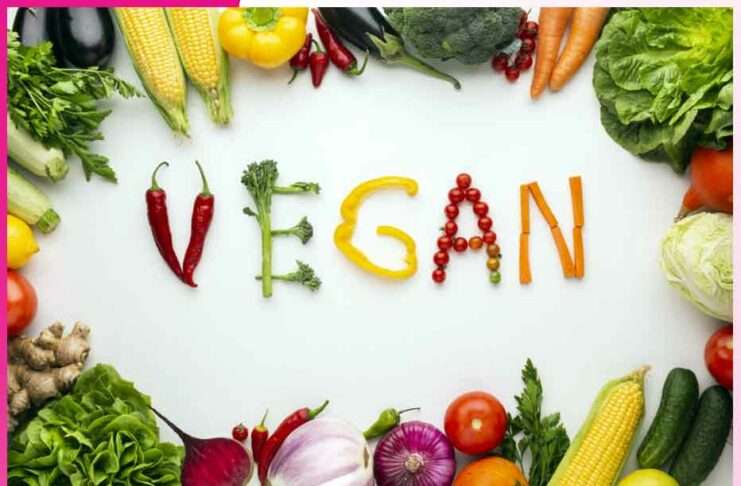A plant-based diet has numerous advantages such as lower risk of heart disease and cancer, weight loss, and improved digestion. However, it may also lack certain nutrients and require careful meal planning for adequate protein intake.
The popularity of plant-based diets has rapidly increased within recent years. According to a report from globaldata, the number of people identifying as vegan in the united states has increased by 600% in the past three years. While many individuals adopt plant-based eating habits for ethical and environmental reasons, others are drawn to the potential health benefits.
Eating a plant based diet can lead to a reduced risk of chronic diseases such as heart disease and cancer, as well as improved digestion and weight loss. However, the diet may also lack essential nutrients, such as vitamin b12 and iron, and require careful planning to ensure sufficient protein intake. This article will explore the pros and cons of a plant-based diet, and the potential benefits and drawbacks that come with it.

Credit: sachishiksha.com
The Pros Of A Plant Based Diet
A plant-based diet has gained popularity in recent years due to its potential health benefits. Science has proven that this diet is not only beneficial for the environment, but it can also improve your overall health in various ways. In this section of the blog post, we’ll explore some of the pros of a plant-based diet.
Improved Heart Health And Reduced Risk Of Heart Disease
Plant based diets are high in fruits, vegetables, whole grains, and legumes. Consuming these foods is linked to a reduced risk of coronary heart disease, lower blood pressure, and lower cholesterol levels. The following are the reasons why a plant-based diet is beneficial for heart health:
- Plant based diets are rich in phytochemicals and antioxidants that prevent inflammation and oxidative stress, which are factors that contribute to heart disease.
- Consuming a plant-based diet also helps in weight management, thereby reducing the risk of obesity- a major risk factor for heart disease.
There are several studies conducted to support the heart-health benefits of a plant-based diet. For instance, a study published in current atherosclerosis reports reveals that plant-based diets can lead to significant decreases in blood pressure, total cholesterol, and low-density lipoprotein cholesterol levels.
Another study published in the european journal of clinical nutrition found that vegetarians have a 25% lower risk of dying from heart disease compared to non-vegetarians.

Reduced Risk Of Cancer
A plant based diet can also help prevent certain types of cancer. Fruits and vegetables are rich in fiber, vitamins, and minerals that can protect against various types of cancers, such as lung, colon, breast, and pancreatic cancer. The following are the reasons how a plant-based diet can help prevent cancer:
- Plant-based diets contain antioxidants that neutralize free radicals, which are unstable molecules that can damage cells and cause cancer.
- They are also rich in fiber that helps promote regular bowel movements and reduce the time that toxins are in the colon. This reduces the risk of colon cancer.
Research supports the claim that a plant-based diet can reduce the risk of cancer. A study published in the journal of the american medical association shows that vegetarians’ risk of developing cancer is 10% lower than non-vegetarians. Another study published in the journal of nutrition found that consuming more fruits and vegetables was associated with a lower risk of developing lung cancer.
Improved Digestion
Plant-based diet are easier to digest compared to animal-based diets. They contain fiber that aids in digestion and promotes bowel regularity. The following are the reasons why a plant-based diet is easier to digest:
- Plant-based diets reduce the risk of constipation and bloating by improving digestive health.
- They also contain probiotics that can help in the growth of healthy gut bacteria.
Several scientific studies show that plant-based diets improve gastrointestinal health. For instance, a study published in the journal nutrients concludes that plant based diets are beneficial in the treatment of inflammatory bowel disease. Another study published in the journal of human nutrition and dietetics shows that a vegetarian diet can be more effective in reducing symptoms of irritable bowel syndrome than a traditional diet.
Plant-based diets offer several health benefits, including improved heart health, reduced risk of cancer, and improved digestion. Incorporating plant-based foods into your diet could be a great way to enhance your overall health and well-being.
The Cons Of A Plant-Based Diet
A plant-based diet has several potential benefits such as reducing the risk of heart diseases and promoting weight loss. However, some cons come with it. Here are some of the potential downsides of following a plant-based diet:
Nutrient Deficiencies
A plant-based diet can sometimes lack certain essential nutrients that your body needs such as:
- Vitamin b12, which is primarily found in animal-based foods, and can cause fatigue, weakness, and nerve damage if deficient.
- Iron, which is necessary for the production of red blood cells, and can cause anemia if deficient.
- Omega-3 fatty acids, which are important for brain and heart health, and can cause mood swings and cognitive decline if deficient.
Difficulty Getting Enough Protein
Plant based diets can make it difficult for individuals to consume sufficient protein as it primarily comes from animal-based products. Some of the best plant-based protein sources that one can consume include:
- Legumes such as lentils, chickpeas, and beans.
- Nuts and seeds such as almonds and chia seeds.
- Whole grains such as quinoa.
Social Challenges
Social eating can pose a challenge for individuals on plant-based diets. Common social situations include:
- Eating out at restaurants, sometimes limited plant-based options are available.
- Work or family events, where the menu is usually predetermined.
- Attending barbeques, where meat is often the main attraction.
While a plant based diet has several benefits, it is important to note that it may also have some potential cons, particularly when it comes to nutrient deficiencies, protein intake and social challenges. However, with proper planning and research, these challenges can be mitigated.
Sustainability
Explanation Of The Environmental Benefits Of A Plant Based Diet
A plant-based diet refers to a diet that mainly consists of fruits, vegetables, grains, and legumes. Opting for a plant-based diet does not only have health benefits but also comes with environmental benefits. A plant-based diet is more sustainable than a meat-based diet, and here are the reasons why:
- Plant based diets require fewer resources. For instance, it takes about 20 times as much energy to produce a calorie of beef as it does to produce a calorie of potatoes.
- Livestock agriculture accounts for almost 15% of global greenhouse gas emissions. By reducing the consumption of meat, we can reduce the impact of animal agriculture on climate change.
- A plant-based diet reduces the number of animals raised for agricultural purposes. This, in turn, leads to a decrease in deforestation since there will be no need for forest clearances to create pasturelands for animal agriculture.
Example Studies And Statistics Supporting The Environmental Benefits Of A Plant- Based Diet
Several studies and statistics have shown that opting for a plant-based diet has a positive impact on the environment. Here are some examples:
- According to a study by the university of oxford, if everyone in the uk switched to a plant-based diet, it would reduce food-related greenhouse gas emissions by 73%.
- Research by the food and agriculture organization of the united nations revealed that animal agriculture contributes to about 18% of global human-induced greenhouse gas emissions.
- A study by the university of minnesota showed that a shift towards a plant-based diet would result in a 75% reduction in global farmland use.
Summary Of The Impact Of Animal Agriculture On The Environment
The practice of animal agriculture has a significant impact on the environment. Here are some of the ways in which animal agriculture affects the environment:
- Animal agriculture is responsible for the emission of large amounts of greenhouse gases, mainly methane and carbon dioxide, that contribute to climate change.
- The production of animal feed requires large amounts of land and water resources.
- The use of fertilizers and pesticides in the production of animal feed leads to soil and water pollution.
- The waste produced by animals can also pollute rivers and other water bodies.
A plant-based diet is a more sustainable and environmentally friendly alternative to a meat-based diet. By reducing the consumption of meat, we can positively impact the environment and create a more sustainable future for generations to come.
Transitioning To A Plant-Based Diet
Are you thinking of transitioning to a plant-based diet but not sure where to start? Don’t worry, you’re not alone. Many people are looking to incorporate more plant-based foods into their diets for health, ethical, and environmental reasons. Here are some key points to consider when making the transition:
Explanation Of How To Transition To A Plant-Based Diet
- Educating yourself: Before making any drastic changes to your diet, it’s necessary to educate yourself. Learn about the benefits of plant-based diets, the nutrients that you should be mindful of, and the foods that are rich in those nutrients.
- Start small: You don’t have to go 100% plant-based overnight. Start by incorporating more fruits, vegetables, and whole grains into your diet, and gradually reduce your intake of animal products.
- Meal planning: Meal planning is crucial when transitioning to a plant-based diet. Plan your meals ahead of time to ensure that you’re getting all the nutrients you need and that you won’t be left feeling hungry.
- Experiment with new recipes: One of the benefits of transitioning to a plant-based diet is the opportunity to experiment with new flavors and ingredients. Look for plant-based recipe books and websites to keep your meals exciting.
Tips For Success When Transitioning
- Take it slow: Like any lifestyle change, transitioning to a plant-based diet takes time and patience. Don’t beat yourself up if you slip up or have a difficult time adjusting.
- Find support: Talk to your friends and family about your decision to transition to a plant-based diet. They may be able to offer support or join you on your journey.
- Get creative with substitutions: Many plant-based substitutes are available for animal products such as meat, cheese, and milk. Experiment with different brands and types to find what works for you.
- Be mindful of nutrient intake: It’s important to ensure that you’re getting all the necessary nutrients from your food. Consult with a registered dietitian to create a well-balanced meal plan that meets your individual needs.
Explanation Of Why It Is Important To Transition Gradually
- Avoid overwhelming your body: Sudden changes to your diet can shock your body and cause digestive issues. Gradual changes will give your body time to adjust to a new way of eating.
- Sustainable lifestyle change: Making small changes over time is more sustainable than dramatic changes that are difficult to maintain in the long run.
- Learn your body’s needs: Everyone’s body is different, and gradual changes can help you learn what works best for your individual needs.
Frequently Asked Questions On Pros And Cons Of Plant Based Diet
Is It Necessary To Supplement On Plant-Based Diet?
Supplementation on plant-based diet is not necessary as long as you’re eating a variety of whole foods, fortified foods and taking in adequate nutrients. However, it is recommended to consider supplementing with vitamin b12, vitamin d, and omega-3 fatty acids to avoid any potential deficiencies.
Can Plant-Based Diet Aid Weight Loss?
Yes, plant-based diets can aid in weight loss. Plant-based foods are generally lower in calories, fat, and higher in fiber, which helps create a feeling of fullness. Studies have shown that individuals following plant-based diets have had significant weight loss and improved health markers over time.
Does A Plant-Based Diet Provide Enough Protein?
Yes, plant-based diets can provide enough protein. A balanced plant-based diet includes a variety of protein sources such as beans, lentils, nuts, seeds, tofu, and tempeh. These sources provide all the essential amino acids needed for a healthy diet, and do not contribute to the development of chronic diseases such as heart disease, diabetes and cancer.
What Are The Health Risks Associated With A Plant-Based Diet?
A plant-based diet has been shown to have many health benefits; however, there are some potential risks if the diet is not properly planned. These risks include vitamin and mineral deficiencies and limited protein intake. It is important to consult a healthcare professional and registered dietitian to ensure adequate nutrient intake on a plant-based diet.
Is A Plant-Based Diet Suitable For All Stages Of Life?
Yes, a plant-based diet can be suitable for all stages of life, including infancy, childhood, adulthood, and pregnancy. However, it is essential to have expert guidance, especially during infancy and pregnancy, from healthcare professionals to ensure adequate nutrient intake. A balanced and varied diet with fortified foods and supplements can meet all nutrient requirements during all stages of life.
Can A Plant-Based Diet Improve Heart Health?
Yes, a plant-based diet has been shown to improve heart health. Plant-based foods are generally low in saturated fat, which can lower the risk of heart disease. Studies have demonstrated that following a plant-based diet can improve cholesterol levels, blood pressure, and reduce the risk of heart disease.
Conclusion
A plant-based diet has numerous benefits such as weight loss, reduced risk of heart diseases, and cancer prevention. It encourages the consumption of plant foods, whole grains, and plant-based proteins while discouraging animal products. However, there are some drawbacks to this lifestyle that must be considered.
Nutritional deficiencies are a concern, particularly when it comes to vitamin b12, iron, and protein. Another drawback is the initial cost and effort involved in revamping your entire diet. It can also be challenging to stick to a plant-based diet while eating out or at social gatherings.
Ultimately, it’s essential to weigh the pros and cons of a plant-based diet and determine if it is sustainable for your lifestyle. Making gradual changes and seeking guidance from a registered nutritionist can help overcome the hurdles of transitioning to a plant-based diet.
If you decide to pursue this lifestyle, it is recommended to monitor vitamin b12, iron, and protein intake and supplement, if necessary, to avoid deficiencies and reap the numerous benefits a plant-based diet can provide.




